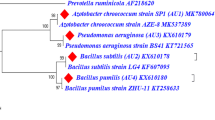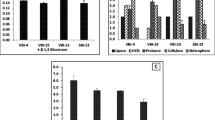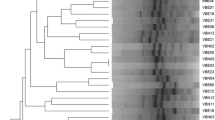Abstract
The hardening step of micropropagation is crucial to make the in vitro raised plants mature and further enhancing their survivability in the external environment. Auxin regulates various root physiological parameters in plant systems. Therefore, the present study aimed to assess the impact of three vermicompost-derived IAA-releasing microbial strains, designated S1, S2, and S3, as biofertilizers on in vitro raised banana plantlets during primary hardening. The High-Performance Thin-Layer Chromatography (HPTLC) analysis of these strains revealed a higher IAA content for S1 and S2 than that of S3 after 144 h of incubation. In total, seven different treatments were applied to banana plantlets, and significant variations were observed in all plant growth parameters for all treatments except autoclaved cocopeat (100%) mixed with autoclaved vermicompost (100%) at a 1:1 ratio. Among these treatments, the application of S3 biofertilizer: autoclaved cocopeat (1:1), followed by S2 biofertlizer: autoclaved cocopeat (1:1), was found to be better than other treatments for root numbers per plant, root length per plant, root volume, and chlorophyll content. These findings have confirmed the beneficial effects of microbial strains on plant systems and propose a link between root improvement and bacterial auxin. Further, these strains were identified at the molecular level as Bacillus sp. As per our knowledge, this is the first report of Bacillus strains isolated from vermicompost and applied as biofertilizer along with cocopeat for the primary hardening of banana. This unique approach may be adopted to improve the quality of plants during hardening, which increases their survival under abiotic stresses.






Similar content being viewed by others
Data Availability
The generated nucleotide sequences have been deposited into the NCBI database and are available in (https://www.ncbi.nlm.nih.gov/nuccore/) under the accession numbers: OP678039, OP678040, and OP678041.
References
Acharya V, Ghosh A, Chowdhury AR, Datta P (2021) Tannic acid-crosslinked chitosan matrices enhance osteogenic differentiation and modulate epigenetic status of cultured cells over glutaraldehyde crosslinking. Soft Mater 20(2):1–12. https://doi.org/10.1080/1539445X.2021.1933032
Ahmed A, Hasnain S (2010) Auxin-producing Bacillus sp.: auxin quantification and effect on the growth of Solanum tuberosum. Pure App Chem 82:313–319. https://doi.org/10.1351/PAC-CON-09-02-06
Ait Bessai S, Bensidhoum L, Nabti E (2022) Optimization of IAA production by telluric bacteria isolated from northern Algeria. Biocatal Agric Biotechnol 41:102319. https://doi.org/10.1016/j.bcab.2022.102319
Ali A, Sajid A, Naveed NH et al (2011) Initiation, proliferation and development of micro-propagation system for mass scale production of banana through meristem culture. Afr J Biotechnol 10. https://doi.org/10.5897/AJB11.2079
Bag N, Palni LMS, Nandi SK (2019) An efficient method for acclimatization. Curr Sci 117:288–293
Baghaee Ravari S, Heidarzadeh N (2014) Isolation and characterization of rhizosphere auxin producing Bacilli and evaluation of their potency on wheat growth improvement. Arch Agron Soil Sci 60:895–905. https://doi.org/10.1080/03650340.2013.856003
Beibei W, Zongzhuan S, Zhang F et al (2016) Bacillus amyloliquefaciens strain W19 can promote growth and yield and suppress Fusarium wilt in banana under greenhouse and field conditions. Pedosphere 26:733–744
Bhalsing SR, Teli NP, Pawar PK et al (2001) Tissue culture grown Banana: a cost effective strategy for Hardening. Physiol Mol Biol Plants 7:185–189
Bhojwani SS, Razdan MK (1996) Plant tissue culture: theory and practice—a revised edition, vol Vol 5. Elsevier, Amsterdam, pp 483–536
Birnboim HC, Doly J (1979) A rapid alkaline extraction procedure for screening recombinant plasmid DNA. Nucleic Acids Res 7:1513–1523. https://doi.org/10.1093/nar/7.6.1513
Bishnu Maya KC, Gauchan DP, Khanal SN et al (2020) Extraction of indole-3-acetic acid from plant growth promoting rhizobacteria of bamboo rhizosphere and its effect on biosynthesis of chlorophyll in bamboo seedlings. Indian J Agric Res 54:781–786
Cai G, Li J, Zhou M et al (2022) Compost-derived indole-3-acetic-acid-producing bacteria and their effects on enhancing the secondary fermentation of a swine manure-corn stalk composting. Chemosphere 291:132750
Casimiro I, Marchant A, Bhalerao RP et al (2001) Auxin transport promotes Arabidopsis lateral root initiation. Plant Cell 13:843–852
Chamling N, Bhowmick N (2021) Effect of secondary hardening media on the performance of in-vitro raised banana plantlets cv. Grand Naine J Crop Weed 17:93–98. https://doi.org/10.22271/09746315.2021.v17.i1.1410
Chandra P, Tripathi P, Chandra A (2018a) Isolation and molecular characterization of plant growth-promoting Bacillus spp. and their impact on sugarcane (Saccharum spp. hybrids) growth and tolerance towards drought stress. Acta Physiol Plant 40:199. https://doi.org/10.1007/s11738-018-2770-0
Chandra S, Askari K, Kumari M (2018b) Optimization of indole acetic acid production by isolated bacteria from Stevia rebaudiana rhizosphere and its effects on plant growth. J Genet Eng Biotechnol 16:581–586. https://doi.org/10.1016/j.jgeb.2018.09.001
Chhetri K, Mathew B, Pereira LS (2021) Micropropagation of Citrus indica Tanaka using shoot tips from mature trees. Plant Tissue Cult & Biotech 31:13–23. https://doi.org/10.3329/ptcb.v31i1.54107
Chu TN, Bui LV, Hoang MTT (2020) Pseudomonas PS01 isolated from Maize Rhizosphere alters Root System Architecture and promotes Plant Growth. Microorganisms 8:471. https://doi.org/10.3390/microorganisms8040471
Dash M, Yordanov YS, Georgieva T et al (2017) Poplar Ptab ZIP 1-like enhances lateral root formation and biomass growth under drought stress. Plant J 89:692–705
de Souza R, Ambrosini A, Passaglia LMP (2015) Plant growth-promoting bacteria as inoculants in agricultural soils. Genet Mol Biol 38:401–419. https://doi.org/10.1590/S1415-475738420150053
Dev R, Singh SK, Dayal V et al (2019) Standardization of in vitro hardening strategies for tissue cultured wine grape (Vitis vinifera L) Genotypes. Int J Curr Microbiol App Sci 8:2108–2117. https://doi.org/10.20546/ijcmas.2019.802.244
Emami S, Alikhani HA, Pourbabaei AA et al (2019) Effect of rhizospheric and endophytic bacteria with multiple plant growth promoting traits on wheat growth. Environ Sci Pollut Res 26:19804–19813. https://doi.org/10.1007/s11356-019-05284-x
Fu S-F, Wei J-Y, Chen H-W et al (2015) Indole-3-acetic acid: a widespread physiological code in interactions of fungi with other organisms. Plant Signal Behav 10:e1048052. https://doi.org/10.1080/15592324.2015.1048052
Gafur A (2022) Plant Growth Promoting Microbes in the Future Management of Indonesian Estate Forests. KLS. https://doi.org/10.18502/kls.v7i3.11103
Gang S, Sharma S, Saraf M et al (2019) Analysis of indole-3-acetic acid (IAA) production in Klebsiella by LC-MS/MS and the Salkowski method. https://doi.org/10.21769/BioProtoc.3230. BIO-PROTOCOL 9:
Hao Y-J, Wei W, Song Q-X et al (2011) Soybean NAC transcription factors promote abiotic stress tolerance and lateral root formation in transgenic plants. Plant J 68:302–313
Hassan SAM, Taha RA, Zaied NSM et al (2022) Effect of vermicompost on vegetative growth and nutrient status of acclimatized Grand Naine banana plants. Heliyon 8:e10914. https://doi.org/10.1016/j.heliyon.2022.e10914
Hazarika BN (2006) Morpho-physiological disorders in in vitro culture of plants. Sci Hortic 108:105–120. https://doi.org/10.1016/j.scienta.2006.01.038
Kargapolova KYu, Burygin GL, Tkachenko OV et al (2020) Effectiveness of inoculation of in vitro-grown potato microplants with rhizosphere bacteria of the genus Azospirillum. Plant Cell Tiss Organ Cult 141:351–359. https://doi.org/10.1007/s11240-020-01791-9
Kashyap S, Tharannum S, R T (2019) Influence of formulated organic plant tissue culture medium in the shoot regeneration study of Brassica juncea (l.) - Indian mustard. J Plant Biotechnol 46:114–118. https://doi.org/10.5010/JPB.2019.46.2.114
Kashyap S, Kapoor N, Kale RD (2017) Micropropagation of B. monnieri using humin media in plant tissue culture. Ann Plant Sci 6:1625–1629
Kashyap S, Suresh A, Tharannum S (2022) Micropropagation of Solanum lycopersicum L. using chemical free formulated organic plant growth media. Plant Sci Today 9:132–136
Kaur H, Anand M, Goyal D (2011) Optimization of potting mixture for hardening of in vitro raised plants of Tylophora indica to ensure high survival percentage. Int J Med Arom Plants 1:83–88
Kumar K, Rao IU (2012) Morphophysiologicals problems in acclimatization of micropropagated plants in-ex vitro conditions-A reviews. J Ornam Hortic Plants 2(4):271–283
Lebrazi S, Niehaus K, Bednarz H et al (2020) Screening and optimization of indole-3-acetic acid production and phosphate solubilization by rhizobacterial strains isolated from Acacia cyanophylla root nodules and their effects on its plant growth. J Genet Eng Biotechnol 18:71. https://doi.org/10.1186/s43141-020-00090-2
Li W, Shi Y, Zhu D et al (2021) Fine root biomass and morphology in a temperate forest are influenced more by the nitrogen treatment approach than the rate. Ecological Indicators 130https://doi.org/10.1016/j.ecolind.2021.108031
Ma F, Wang L, Li J et al (2014) Interaction between HY1 and H2O2 in auxin-induced lateral root formation in Arabidopsis. Plant Mol Biol 85:49–61. https://doi.org/10.1007/s11103-013-0168-3
Mengesha A, Ayenew B, Tadesse T (2013) Acclimatization of in Vitro Propagated Pineapple (Ananas comosus (L.), var. Smooth cayenne) plantlets to ex Vitro Condition in Ethiopia. Am J Plant Sci 04:317–323. https://doi.org/10.4236/ajps.2013.42042
Mir AR, Siddiqui H, Alam P, Hayat S (2020) Foliar spray of Auxin/IAA modulates photosynthesis, elemental composition, ROS localization and antioxidant machinery to promote growth of Brassica juncea. Physiol Mol Biol Plants 26:2503–2520
Mohite B (2013) Isolation and characterization of indole acetic acid (IAA) producing bacteria from rhizospheric soil and its effect on plant growth. J Soil Sci Plant Nutr 13(3). https://doi.org/10.4067/S0718-95162013005000051
Moore E, Arnscheidt A, Kruger A, Strompl C, Mau M (2004) Simplified protocols for the preparation of genomic DNA from bacterial cultures. Molecular microbial ecology manual, 2nd edn. Kluwer Academic Publishers, Dordrecht, pp 3–18
Mukherjee S, Sain S, Ali M et al (2022) Microbiological properties of Beejamrit, an ancient Indian traditional knowledge, uncover a dynamic plant beneficial microbial network. World J Microbiol Biotechnol 38:111. https://doi.org/10.1007/s11274-022-03296-3
Mukherjee S, Basak A, Chakraborty A et al (2023) Revisiting the oldest manure of India, Kunapajala: Assessment of its animal waste recycling potential as a source of plant biostimulant. Front Sustain Food Syst 6:1073010. https://doi.org/10.3389/fsufs.2022.1073010
Murashige T, Skoog F (1962) A revised medium for rapid growth and bio assays with Tobacco tissue cultures. Physiol Plant 15:473–497
Naveed M, Qureshi MA, Zahir ZA et al (2015) L-Tryptophan-dependent biosynthesis of indole-3-acetic acid (IAA) improves plant growth and colonization of maize by Burkholderia phytofirmans PsJN. Ann Microbiol 65:1381–1389. https://doi.org/10.1007/s13213-014-0976-y
Park S, Kim A-L, Hong Y-K et al (2021) A highly efficient auxin-producing bacterial strain and its effect on plant growth. J Genet Eng Biotechnol 19:179. https://doi.org/10.1186/s43141-021-00252-w
Parray JA, Kamili AN, Reshi ZA et al (2015) Interaction of rhizobacterial strains for growth improvement of Crocus sativus L. under tissue culture conditions. Plant Cell Tiss Organ Cult 121:325–334. https://doi.org/10.1007/s11240-014-0703-1
Patel B, Gami B, Patel N, Bariya V (2015) One step pre-hardening micropropagation of Bambusa balcooa Roxb. J Phytol 7:1–9
Pathma J, Sakthivel N (2012) Microbial diversity of vermicompost bacteria that exhibit useful agricultural traits and waste management potential. SpringerPlus 1:26. https://doi.org/10.1186/2193-1801-1-26
Patten CL, Glick BR (1996) Bacterial biosynthesis of indole-3-acetic acid. Can J Microbiol 42:207–220. https://doi.org/10.1139/m96-032
Pospíšilová J, Tichá I, Kadleček P et al (1999) Acclimatization of Micropropagated Plants to Ex Vitro conditions. Biol Plant 42:481–497. https://doi.org/10.1023/A:1002688208758
Qin H, Huang R (2018) Auxin controlled by ethylene steers root development. Int J Mol Sci 19:3656. https://doi.org/10.3390/ijms19113656
Sabitha R, Xavier TF, Balavivekananthan S, Rose AF (2021) An influence of coco peat and vermicompost on successful ex vitro rooting of micropropagated plantlets of Oxystelma Esculentum R. Br. Int J Bot Stud 6(5):1520–1526
Sadashivam S, Manickam A (2008) Biochemical methods. 3rd ed. New Age International Pvt. Ltd. p. 201–202
Sattelmacher B (1987) Methods for measuring root volume and for studying root morphology. Z für Pflanzenernährung Und Bodenkunde 150(1):54–55
Sharma P, Sarma KP (2011) In vitro propagation of Bambusa balcooa for a better environment. In: International conferences on advances in biotechnology and pharmaceutical sciences (ICABPS’11). Bangkok. pp 248–252
Sharma V, Kamal B, Srivastava N et al (2015) Enhancement of in vitro growth of Swertia Chirayita Roxb. Ex Fleming co-cultured with plant growth promoting rhizobacteria. Plant Cell Tiss Organ Cult 121:215–225. https://doi.org/10.1007/s11240-014-0696-9
Singh VK, Prasad VM, Kumari S et al (2017) Identification of the suitable hardening protocol and hardening medium in Micropropagation of Gerbera (Gerbera jamesonii Bolus). Int J Curr Microbiol App Sci 6:2476–2484. https://doi.org/10.20546/ijcmas.2017.607.292
Sivasankari B (2016) Indole-3-Acetic acid production by the bacterial strains isolated from vermicomposts in the presence and absence of tryptophan. Int J Innov Res Technol Sci Eng 5:92–107
Sondang Y, Anty K, Siregar R (2021) Isolation and Identification of Effective Microorganisms from Water Hyacinth Biofertilizer. IOP Conf Ser: Earth Environ Sci 709:012064. https://doi.org/10.1088/1755-1315/709/1/012064
Spaepen S, Vanderleyden J, Remans R (2007) Indole-3-acetic acid in microbial and microorganism-plant signaling. FEMS Microbiol Rev 31:425–448. https://doi.org/10.1111/j.1574-6976.2007.00072.x
Sun P-F, Fang W-T, Shin L-Y et al (2014) Indole-3-Acetic acid-producing yeasts in the Phyllosphere of the Carnivorous Plant Drosera indica L. PLoS ONE 9:e114196. https://doi.org/10.1371/journal.pone.0114196
Talboys PJ, Owen DW, Healey JR et al (2014) Auxin secretion by Bacillus amyloliquefaciens FZB42 both stimulates root exudation and limits phosphorus uptake in Triticum aestivium. BMC Plant Biol 14:51. https://doi.org/10.1186/1471-2229-14-51
Teixeira da Silva JA, Tsavkelova EA, Zeng S et al (2015) Symbiotic in vitro seed propagation of Dendrobium: fungal and bacterial partners and their influence on plant growth and development. Planta 242:1–22
Teixeira da Silva JA, Hossain MM, Sharma M et al (2017) Acclimatization of in Vitro -derived Dendrobium. Hortic Plant J 3:110–124. https://doi.org/10.1016/j.hpj.2017.07.009
Tian H, De Smet I, Ding Z (2014) Shaping a root system: regulating lateral versus primary root growth. Trends Plant Sci 19:426–431
Vissenberg K, Claeijs N, Balcerowicz D, Schoenaers S (2020) Hormonal regulation of root hair growth and responses to the environment in Arabidopsis. J Exp Bot 71:2412–2427. https://doi.org/10.1093/jxb/eraa048
Yadav AK, Chandra K (2014) Mass production and quality control of microbial inoculants. Proc Indian Natn Sci Acad 80(2):483–489
Yadav A, Mudoi KD, Kumar N et al (2022) Auxin biosynthesis by Microbacterium testaceum Y411 associated with orchid aerial roots and their efficacy in micropropagation. Front Plant Sci 13:1037109. https://doi.org/10.3389/fpls.2022.1037109
Zhu Z, Zhang H, Leng J et al (2020) Isolation and characterization of plant growth-promoting rhizobacteria and their effects on the growth of Medicago sativa L. under salinity conditions. Antonie Van Leeuwenhoek 113:1263–1278. https://doi.org/10.1007/s10482-020-01434-1
Acknowledgements
We are thankful to the commercial plant tissue culture unit of Ramakrishna Mission Vivekananda Educational and Research Institute for providing the basic support to conduct this experiment and to Dr. Dipanjan Ghosh and Dr. Pallab Datta of NIPER-Kolkata, for their kind support in conducting the SEM-based study.
Author information
Authors and Affiliations
Contributions
SSR, SM, and RS: designed the study. RS, SSR, BP and GC: conducted the experiments. RG and BP: analyzed the data. RS, GC,SSR, BP, MNA: wrote the paper. All authors reviewed the manuscript.
Corresponding author
Ethics declarations
Conflict of interest
Authors declare that they have no conflict of interest.
Competing interests
The authors declare no competing interests.
Additional information
Publisher’s Note
Springer Nature remains neutral with regard to jurisdictional claims in published maps and institutional affiliations.
Rights and permissions
Springer Nature or its licensor (e.g. a society or other partner) holds exclusive rights to this article under a publishing agreement with the author(s) or other rightsholder(s); author self-archiving of the accepted manuscript version of this article is solely governed by the terms of such publishing agreement and applicable law.
About this article
Cite this article
Sarkar, R., Mukherjee, S., Pradhan, B. et al. Molecular characterization of vermicompost-derived IAA-releasing bacterial isolates and assessment of their impact on the root improvement of banana during primary hardening. World J Microbiol Biotechnol 39, 351 (2023). https://doi.org/10.1007/s11274-023-03809-8
Received:
Accepted:
Published:
DOI: https://doi.org/10.1007/s11274-023-03809-8




